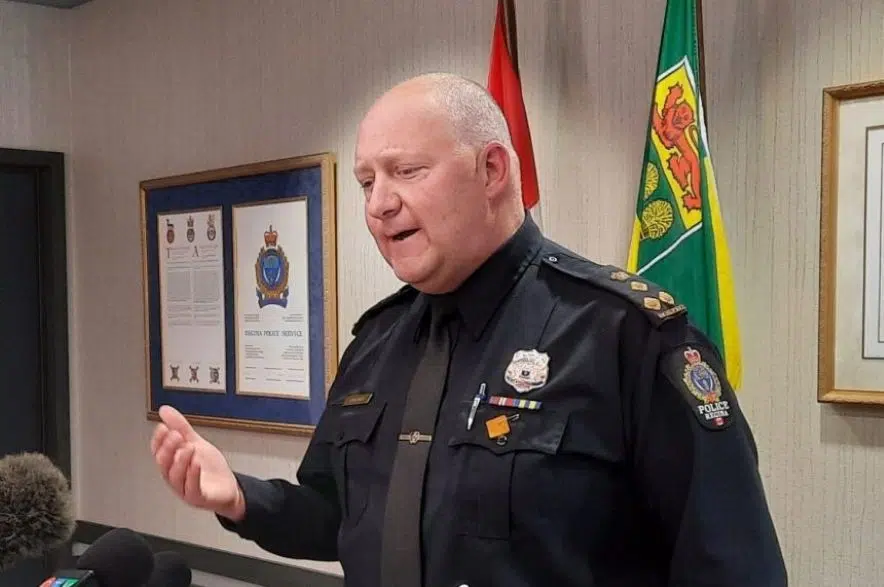Some feathers were ruffled earlier this week when Regina Police Chief Evan Bray made some comments about the homeless camp in front of City Hall, calling it a publicity stunt and exploitation.
Bray is standing by what he said, but is also clarifying just what he meant.
“Our police service, me included, will continue to stand by and support and provide all kinds of assistance, wherever possible, to people that are finding themselves homeless in the city,” Bray began Thursday.
He said there are community-based organization and people in this city who are out helping — bringing blankets and water and food — and have been for years.
The comments he made earlier this week were about people who are trying to exploit the homeless.
“(Those are) people that are using this as a grandstand to stick it to government, to stick it to city hall,” said Bray.
He believes that’s what’s happening in front of Regina City Hall.
“That, to me, is a protest. That, to me, is not about trying to do necessarily what is best for the homeless people, the people that need the help. That’s about exploiting them – and I’m going to stand by my comments on that,” he said.
“There are people out there that go home to their beds at the end of the night that are using people in their most dire time to try and make political points. There are people that are even doing it on a speaking circuit now, talking about the work that they’ve done with this as well. It becomes very self-serving and that very much frustrates me.”
If those people are there to help, asked Bray, why did they bring the encampment to City Hall?
Bray said when the police deal with homeless people or a camp, the goal is never to arrest people.
He gave an incident last week as an example where there was a camp on private property and the owner wanted to clear it out so the police were called. Bray said officers brought social services and mobile crisis with them to try to help those people get a roof over their heads, and some were able to get help.
Bray acknowledges the situation can be complicated and there isn’t the same fix for everyone.
“What some people need is simply a home. What other people need is assistance with an addiction or maybe some long-term trauma or mental health, and so supportive housing becomes part of that discussion as well,” said Bray.
He makes a distinction between homeless people camping together and a protest – and he put the camp in front of City Hall more on the side of a protest.
When asked whether police would break up that camp, Bray said they would treat it like any other camp. He said the goal is not to arrest homeless people, but if someone is protesting and won’t accept help and won’t leave, that’s a different story.
“Sometimes we have to be police; sometimes we do. I don’t make apologies for that. That’s who we are,” said Bray.
City Hall
Activists and those on the frontlines have said often the homelessness situation in Regina and in the province is getting worse. The problem has come up often for city governments and is currently, literally, on the front step of Regina’s City Hall.
While Mayor Sandra Masters said the city puts a lot of support and money into organizations and initiatives to help with the situation, she also said things like social services, mental health and addictions, and housing aren’t municipal jurisdiction.
“In terms of jurisdiction as well as the budgets for it, those exist as two other levels of government who have all the rules, and frankly some of those rules handcuff us right now,” said Masters.
The mayor said watching these problems in her city — while the funding and solutions are another government’s responsibility — is frustrating and disheartening and makes her feel a bit helpless.
“No one has an answer to this. Look across this country; nobody has an answer to this. And so without some sort of federal intervention … we’re all just swimming in this, trying to do the best we can to keep people alive,” said Masters.
She believes there need to be some changes, like a federal plan to address the problem and some kind of action to allow for intervention for people with addictions issues with things like fentanyl and methamphetamines.
Masters said while addiction isn’t the only factor contributing to homelessness, it is a complicating factor to getting people into shelters and to supporting those shelters and keeping them running.
On Thursday morning, Masters said she hadn’t spoken to those in the encampment in front of City Hall but she had reached out to some Indigenous Elders and chiefs, keeping in mind that Indigenous citizens are also members of a First Nation. She said she tried to make those connections and come up with solutions.











